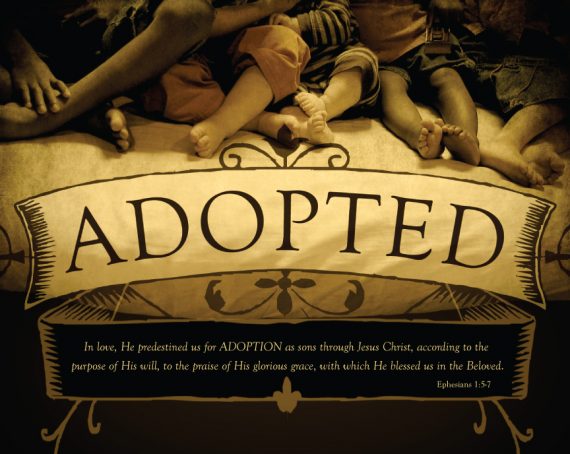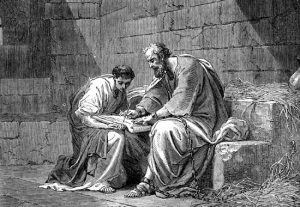The podcast episode above looks at Romans 8:17, and the video below looks at Romans 9:4. Both texts are greatly aided by a proper understanding of how adoption worked in biblical times.
Below is a recording of my first attempt at a Facebook Live video. In it, I discuss the concept of adoption from Scripture and how it helps us understand Romans 9:4.
I am definitely not an expert videographer by any means … Oh well. As mentioned in the video, the information is drawn from my Gospel Dictionary online course, specifically from the lesson on “Adoption.” Members of RedeemingGod.com can take this course for free. You can join here.
Here is a text version of what I was teaching:

Biblical Adoption
While modern adoption is when we take an orphan and adopt them into our family, this is not how adoption worked in Paul’s day.
Back then, the children who were adopted already had parents. Adoption was a way of uniting two rich and powerful families together so that one powerful family adopted the child of another powerful family. Or sometimes, a father who had multiple children would adopt one of his younger children as his heir, thereby displacing the oldest son as the heir.
So adoption was not about giving parents to those who had none, but was about naming a child (of other parents, or even one of your own children) as an heir. Adoption was about glory, honor, and privilege; not about joining a family.
Romans 9:4 and Adoption
Romans 9 is a confusing chapter. Since it is about the election and rejection of Israel for God’s purposes, many believe that Romans 9 teaches that even after we receive eternal life, if we fail to live according to God’s purposes, we either lose our eternal life or we prove we never had it in the first place.
This is, after all, what happened to Israel, is it not? No, it is not.
Election is not about how God, from eternity past, chose who would receive eternal life and who would be condemned to hell forever. Instead, election is about purpose and privilege within the plan of God (see my book, The Re-Justification of God).
It is no surprise, then, that at the beginning of this discussion of Israel’s purpose and privilege within the plan of God, Paul mentions the fact of Israel adoption by God (Rom 9:4). Paul also refers to glory, covenants, the law, service, and promises.
Right at the introduction to Romans 9, Paul shows that he is not writing about how the people of Israel were part of God’s family and then were rejected as members of His family, but is instead writing about the favored members of God’s family who have position, power, and privilege within the family because of how they live.
Though Israel began with the position of being the adopted son, they lost it through disobedience and rebellion. This is why Paul warns us, who are now in the position of adoption, that we must take heed to how we live, or else we too might be cut off (Romans 11:19-23).
This is not about losing eternal life or proving that we were never children of God, but is instead about losing out on the privileged position within the plan and purpose of God for this world.
 Understanding the Gospel requires us to properly understand the key words and terms of the Gospel. Take my course, "The Gospel Dictionary" to learn about the 52 key words of the Gospel, and hundreds of Bible passages that use these words.
Understanding the Gospel requires us to properly understand the key words and terms of the Gospel. Take my course, "The Gospel Dictionary" to learn about the 52 key words of the Gospel, and hundreds of Bible passages that use these words.
This course costs $297, but when you join the Discipleship group, you can to take the entire course for free.




 Among those who knew Paul, such a statement would have been shocking. Paul does not go around cursing people. So Paul, knowing that his statement would have caused the readers in Galatian to scratch their head and wonder if they were hearing him correctly, repeats himself in Galatians 1:9.
Among those who knew Paul, such a statement would have been shocking. Paul does not go around cursing people. So Paul, knowing that his statement would have caused the readers in Galatian to scratch their head and wonder if they were hearing him correctly, repeats himself in Galatians 1:9.
 Under the Mosaic Law, circumcision was a sign of separation. It was a sign that only the circumcised were part of the people of God. Only the circumcised were the “insiders” with God. Everybody else was an “outsider.” Circumcision then, was a way of dividing humanity. It was “us vs. them.”
Under the Mosaic Law, circumcision was a sign of separation. It was a sign that only the circumcised were part of the people of God. Only the circumcised were the “insiders” with God. Everybody else was an “outsider.” Circumcision then, was a way of dividing humanity. It was “us vs. them.” Paul’s message in Galatians is that Golgotha has done away with Gibeath-haaraloth, the hill of foreskins (Josh 5:7).
Paul’s message in Galatians is that Golgotha has done away with Gibeath-haaraloth, the hill of foreskins (Josh 5:7). 
 What a blog post title! Epistolary Diatribe … what???
What a blog post title! Epistolary Diatribe … what??? This is especially true when we recognize that trained “readers” often “performed” the dialogue portions of the letters to a listening audience … many of whom could not read.
This is especially true when we recognize that trained “readers” often “performed” the dialogue portions of the letters to a listening audience … many of whom could not read. Romans 1:18-32 is sort of the introduction to what this other teacher was saying. Therefore, much of what we read in Romans 1:18-32 is not Paul’s ideas, but the ideas of someone that Paul wants to refute.
Romans 1:18-32 is sort of the introduction to what this other teacher was saying. Therefore, much of what we read in Romans 1:18-32 is not Paul’s ideas, but the ideas of someone that Paul wants to refute. 
 In my
In my  So he now makes the ironic and pun-filled statement that we have a choice between anathema and maranatha.
So he now makes the ironic and pun-filled statement that we have a choice between anathema and maranatha. 

 The letter of 1 Corinthians is focused around some issues and questions that had arisen in the Corinthian church. When Paul sets out to address the other issues and questions, he begins with a short summary of what the issue or question was (cf. 1 Cor 7:1; 8:1; 16:1). Chapters 12–14 deal with the issue of spiritual gifts, and ultimately, the gift of speaking in tongues (1 Cor 14), and so 1 Corinthians 12:1-3 is apparently the opening summary statement of what issue or question the Corinthian Christians were facing.
The letter of 1 Corinthians is focused around some issues and questions that had arisen in the Corinthian church. When Paul sets out to address the other issues and questions, he begins with a short summary of what the issue or question was (cf. 1 Cor 7:1; 8:1; 16:1). Chapters 12–14 deal with the issue of spiritual gifts, and ultimately, the gift of speaking in tongues (1 Cor 14), and so 1 Corinthians 12:1-3 is apparently the opening summary statement of what issue or question the Corinthian Christians were facing. Paul spends much of his time in his letter arguing the exact opposite. In fact, this is partly why Paul goes on in 1 Corinthians 15 to argue about the physical resurrection of Jesus. Paul wanted to show that the physical world, and our physical bodies, were not inferior to the spiritual, but were partnered with the spiritual to accomplish God’s will in this world (John argues against similar beliefs in 1 John).
Paul spends much of his time in his letter arguing the exact opposite. In fact, this is partly why Paul goes on in 1 Corinthians 15 to argue about the physical resurrection of Jesus. Paul wanted to show that the physical world, and our physical bodies, were not inferior to the spiritual, but were partnered with the spiritual to accomplish God’s will in this world (John argues against similar beliefs in 1 John).